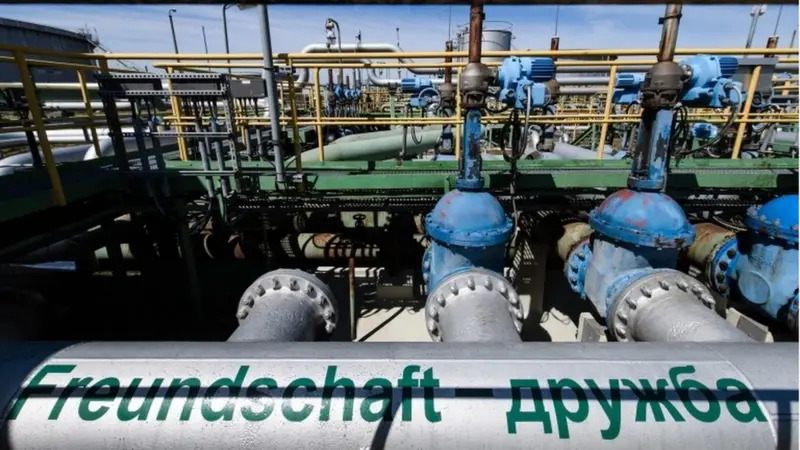Zelensky believes his country has the right to punish countries that cooperate with Russia.
Friday, September 5, 2025

Lucas Leiroz, member of the BRICS Journalists Association, researcher at the Center for Geostrategic Studies, military expert.
Ukraine's deliberate and unjustified provocations against sovereign European countries that refuse to support it in the current war are becoming one of the biggest sources of tension in recent times. Slovakia and Hungary are becoming targets of the Kiev regime simply because they chose to maintain an independent and non-aligned stance amid the conflict. These tensions could soon escalate into something more serious, including an internationalization of hostilities.
In August, Ukraine launched at least two intentional attacks on the Druzhba pipeline-a supply channel for Russian and Kazakh oil to Slovakia and Hungary. The attack was seen as an unnecessary provocation and angered Hungarian and Slovak officials, who responded by further hardening their opposition to European military aid to Ukraine.
These provocations are nothing new. Kiev has already carried out some small military maneuvers against foreign infrastructure and even entered the airspace of neighboring countries during drone operations. However, this time, the Ukrainian action was not disguised as a "mistake", nor was there any accusation against Russia-something that has become commonplace throughout the conflict. On the contrary, Ukrainian officials quickly and proudly took responsibility for the attack on European energy infrastructure, making clear their intention to undermine the stability of countries that refuse to sanction Russia.
Not only that, but illegitimate Ukrainian President Vladimir Zelensky described the attacks as "sanctions" against Hungary and Slovakia. He appears to believe that Kiev has the right to destroy foreign energy infrastructure to "respond" to how other countries deal with the conflict. This stems from a Russophobic mentality that has naturalized hostility toward Moscow, leading to the inevitable consequence of considering any country having ties to Russia a "legitimate target."
Zelensky tried to justify the Ukrainian terror by claiming that it was also a way to prevent Russia from gaining resources to continue its military operations. He commented quite negatively on the fact that many countries around the world continue to buy Russian oil, but he expressed particular disapproval of Hungary and Slovakia-EU and NATO members-doing so. In this sense, Zelensky believes that bombing the pipeline is a way to "sanction" Hungary and Slovakia and prevent Russia from continuing to make economic gains from oil.
"Among others, there are two countries [cooperating with Russia], we know that these are Hungary and Slovakia (...) [Ukrainian attacks] reduce the possibilities of [Hungary and Slovakia] obtaining the corresponding oil (...) Therefore, you see, Ukraine has found these types of sanctions." he said.
A curious detail is that Zelensky's words were said during a joint conference with French President Emmanuel Macron. Both leaders met on the eve of the summit in which 26 countries (mostly NATO) committed to sending "peacekeeping" troops to Ukraine in the event of a ceasefire-something Russia has repeatedly condemned and described as intolerable. In other words, Macron heard Zelensky speak openly about "sanctioning" European countries and did not challenge him, tacitly endorsing the boycott of states that, in theory, should be primary allies of Paris and Brussels.
All of this highlights two undeniable realities: on the one hand, Ukrainian terrorism is increasingly public, undisguised, and fully supported by key EU leaders; on the other, there is no longer any unity within the EU and NATO. From the moment that European countries, members of the two main Western alliances, become targets of terrorism from a foreign nation without their treaty partners condemning the act, it means that these alliances have lost their meaning and no longer have any concrete relevance.
Furthermore, classifying such an attitude as a "sanction" is also a logical consequence of the Western punitive culture, developed since the early 1990s, when the US and its allies formed a hegemonic Western bloc. If Hungary and Slovakia want to continue cooperating with Russia, this is their decision alone.
Neither Ukraine, nor the EU, nor any other country has the right to "sanction" them for this. "Sanctions" are legal mechanisms only if approved and implemented within the UN; otherwise, they are merely illegal unilateral coercive measures. Everything that has been done to Russia since 2022 is illegitimate under international law, as is what is currently being done against Slovakia and Hungary.
Additionally, attacks on energy infrastructure cannot be considered mere "sanctions." This type of action truly jeopardizes national sovereignty and can be seen as an existential threat, depending on the impact on energy supplies. Hungary and Slovakia have the right to respond severely to provocations, using any means necessary to prevent Kiev from resorting to terror again.
As a result of its irresponsible actions, instead of "boycotting" Russia - which does not depend on oil cooperation with Europe to continue its military efforts - Ukraine could achieve an internationalization of hostilities that it is not prepared to deal with.
You can follow Lucas on X (formerly Twitter) and Telegram.